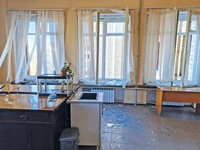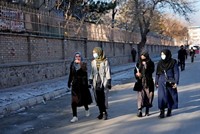Advertisement
Grab your lab coat. Let's get started
Welcome!
Welcome!
Create an account below to get 6 C&EN articles per month, receive newsletters and more - all free.
It seems this is your first time logging in online. Please enter the following information to continue.
As an ACS member you automatically get access to this site. All we need is few more details to create your reading experience.
Not you? Sign in with a different account.
Not you? Sign in with a different account.
ERROR 1
ERROR 1
ERROR 2
ERROR 2
ERROR 2
ERROR 2
ERROR 2
Password and Confirm password must match.
If you have an ACS member number, please enter it here so we can link this account to your membership. (optional)
ERROR 2
ACS values your privacy. By submitting your information, you are gaining access to C&EN and subscribing to our weekly newsletter. We use the information you provide to make your reading experience better, and we will never sell your data to third party members.
Environment
Chemists In The Cross Fire
Israel-Lebanon conflict stymies academic research, disrupts university schedules
by Stephen K. Ritter
August 11, 2006
Fighting between Lebanon-based Hezbollah militia and Israeli troops has moved into its fifth week without a workable diplomatic solution. The conflict, as well as ongoing strife in Gaza, has created havoc for universities in the region during their summer break, according to several chemists contacted by C&EN.
In Haifa and other areas of northern Israel, many people have fled south to Tel Aviv, beyond the range of Hezbollah rocket attacks. Ten universities in the area with a total enrollment of about 40,000 students are being affected, notes chemistry professor Yitzhak Apeloig, president of Technion-Israel Institute of Technology, in Haifa.
The first major missile attack on Haifa occurred on July 16, Apeloig says, when Technion undergraduates were just beginning final exams. The campus was evacuated and closed for a week to prepare for possible further attacks, but it's now open with about 70% of the staff reporting to work.
"As a result of the situation, we moved examinations to the beginning of September," Apeloig notes. "This change upsets the plans of thousands of students, especially those who were in the last semester of their studies. In addition, we had to cancel the summer semester, which was to begin on Aug. 6.
"Research continues, but certainly not at the regular pace, especially on days when air-raid sirens sound eight to 10 times and people rush to shelters," Apeloig adds. "There are many faculty members and graduate students who canceled plans to present their work at scientific meetings or to do research abroad during the summer break."
Meanwhile, analytical chemist Najat A. Saliba of American University of Beirut, in Lebanon, reports that damage to roads and bridges from the bombing and the threat of more bombing have nearly shut down the university, except for the hospital. Saliba left Lebanon when the recent violence began, traveling to the U.S. on a planned research visit to the University of California, Irvine. She is staying in touch with members of her group and is encouraging them to do what work they can at home because daily travel is nearly impossible and unsafe.
"Science and research become secondary when the game of life and death prevails," Saliba observes. "The news and pictures of displaced families and dead children are strong distractions when trying to focus on an infrared peak." She will continue working in California until her planned return to Beirut in early September.
Back in Israel, computational chemist Sason Shaik of Hebrew University of Jerusalem comments that the situation in Jerusalem and the southern half of Israel is quieter, and universities continue to operate, although there are constant alerts for suicide bombers and the threat of rocket attacks from Gaza. C&EN's efforts to contact academic chemists in Gaza were unsuccessful.
"The general feeling in Israel is grim, and the hopes for peace seem to have diffused completely," Shaik says. Nearly everyone has family members affected by the fighting, he notes, and some students have been called to join their army units. Shaik is trying to keep his research group working, "but this atmosphere has affected our ability to concentrate."




Join the conversation
Contact the reporter
Submit a Letter to the Editor for publication
Engage with us on Twitter